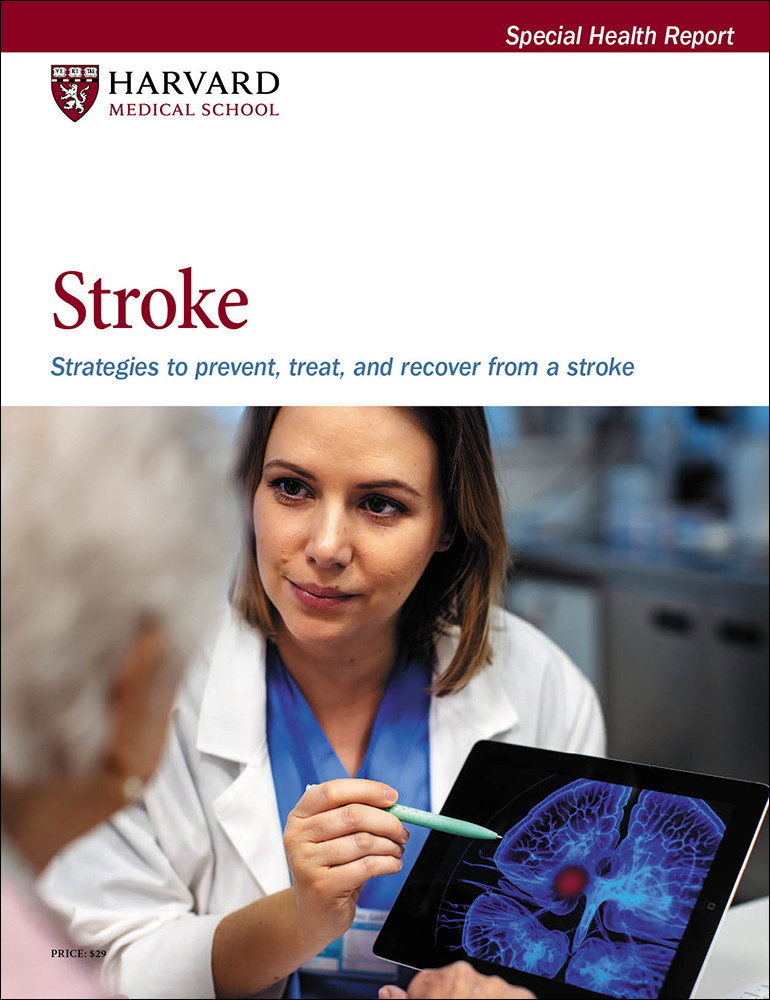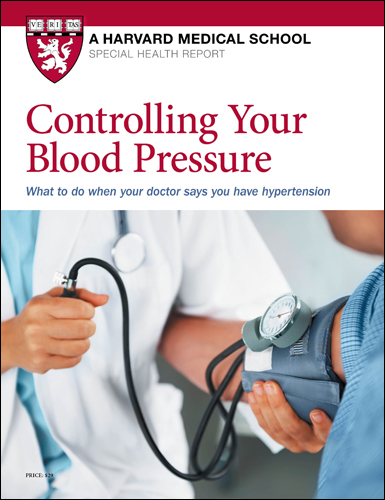
5 timeless habits for better health

What are the symptoms of prostate cancer?

Is your breakfast cereal healthy?

When pain signals an emergency: Symptoms you should never ignore

Does exercise give you energy?

Acupuncture for pain relief: How it works and what to expect

How to avoid jet lag: Tips for staying alert when you travel

Biofeedback therapy: How it works and how it can help relieve pain

Best vitamins and minerals for energy

Should you take probiotics with antibiotics?


Stroke: Strategies to prevent, treat, and recover from a "brain attack"
Protect your brain: That’s the strategy that Harvard doctors recommend in this report on preventing and treating stroke. Whether you’ve already had a ministroke or a major stroke, or have been warned that your high blood pressure might cause a future stroke, Stroke: Strategies to prevent, treat, and recover from a "brain attack" provides help and advice.
Other Product Information
Stroke is a feared medical problem because it can be debilitating or even deadly. Your best defense is to make sure you know how to prevent a stroke, and how to recognize one so you can get treatment right away.
In Stroke: Strategies to prevent, treat, and recover from a "brain attack," Harvard Medical School experts distill the latest research and recommendations into understandable advice that can help you prevent or cope with a stroke.
Harvard Medical School’s Stroke report reveals:
- The risk factors that increase your chances of having a stroke
- Why stroke symptoms can differ from person to person
- The reason “ministrokes” can be just as serious as ischemic strokes
- The app you should have on your phone or tablet that shows how to detect a stroke
- The type of therapist you may not know about who can help you regain speech after a stroke
- And so much more!
Prepared by the editors of Harvard Health Publishing in consultation with Natalia S. Rost, MD, MPH C. Miller Fisher Endowed Chair in Stroke Research and Research Scholar, Massachusetts General Hospital; Professor of Neurology, Harvard Medical School and Qing Mei Wang, MD, PhD Assistant Professor of Physical Medicine and Rehabilitation, Harvard Medical School. 53 pages. (2025)
Who is at risk for stroke?
Some factors that increase your stroke risk are things you can change. Other risk factors can’t be changed. However, simply knowing you’re at risk can make you more vigilant—and more likely to take other riskreducing steps that are within your control. Here are risk factors that can’t be changed:
Age. The odds of having a stroke more than double every 10 years after age 55. More than two-thirds of strokes involve people over age 65, and 88% of deaths from stroke are in that age group. But stroke rates among young and middle-aged men and women have risen by about 15%, as risk factors like obesity, diabetes, and high blood pressure have increased in younger people.
Sex. Each year, more women than men have strokes, and women are more likely to die from a stroke (see “Strokes among women: Different risks, different outcomes,” page 6). The risk of stroke rises once a woman reaches menopause. Certain conditions, like pre-eclampsia or eclampsia in pregnancy; endometriosis; premature ovarian failure before age 40; and menopause before age 45 also increase stroke risk.
Race. Among young and middle-aged adults, the risk of stroke is four times higher in Blacks than in whites. Stroke rates are twice as high in Latinos compared with whites. Increasingly, experts are acknowledging that chronic stress and other consequences of systemic racism (such as less access to healthy living situations and good health care) likely contribute to these disparities.
Family history. If someone in your immediate family has had a stroke, your risk is about 30% higher than average. Having a parent who had a stroke before age 65 triples your risk.
Genetic factors can influence the potential for blood to clot abnormally, as well as increase the risk of other medical problems that affect your stroke risk. Aneurysms and arteriovenous malformations—two conditions that cause hemorrhagic strokes—clearly have a genetic basis. But genes might not be the only culprit. In addition to sharing many genes, relatives may also share eating habits and other behaviors that can promote strokes. If you have a strong family history of strokes, talk with your doctor about preventive measures . Fortunately, you can take steps to control other (“modifiable”) risk factors for strokes, especially ischemic strokes. The key is to manage medical conditions and behaviors that increase your risk. The most common risk factors for both ischemic strokes and TIAs are:
- high blood pressure (hypertension)
- diabetes
- unhealthy cholesterol levels
- obesity• cigarette smoking
- recreational/non-medical drug use
- excessive alcohol use
- a sedentary lifestyle combined with a poor diet.
All of these factors affect the health of your blood vessels, increasing your risk not only for a stroke, but also for heart disease. Work with your doctor to make sure you keep these under tight control.
When it comes to hemorrhagic strokes, the risk factors are not as clear, though the majority of experts agree that high blood pressure is a common factor. While some types of hemorrhagic strokes are more likely to occur in people with chronic high blood pressure, others seem to strike out of the blue. Regardless, high blood pressure should be treated, even if only to prevent as much brain damage as possible if bleeding should occur.
Furthermore, abnormal blood vessel conditions such as an aneurysm (a bulge in a blood vessel wall that could rupture) or an arteriovenous malformation (an abnormal tangle of blood vessels) increase the risk of brain bleeding; however, these conditions might only be discovered inadvertently while you are undergoing testing for something else—or may not be discovered until a stroke occurs.
- What is a stroke?
- The two major types of strokes
- Ministrokes (TIAs)
- Who i s at risk for a stroke?
- Stroke warning signs and symptoms
- What to do if a stroke occurs
- How strokes affect the brain
- Right and left hemispheres: How damage in either one affects you
- Regions of the brain: What skills are compromised
- Medical problems that raise stroke risk
- High blood pressure
- Atrial fibrillation
- Heart attack and other heart conditions
- Diabetes
- Sleep apnea
- Estimating your risk for stroke
- SPECIAL SECTION: Lifestyle changes to help prevent strokes
- Diagnosing a stroke
- History and physical examination
- Laboratory tests
- Imaging and blood flow studies
- Treating ischemic strokes
- Phase 1: Destroy the clot
- Phase 2: Prevent new clots
- Phase 3: Prevent another stroke
- Treating hemorrhagic strokes
- Aneurysm treatment
- Arteriovenous malformant treatment
- Recovering from a stroke
- Prepering for hospital discharge
- Outpatient vs. inpatient rehabilitation
- Physical, occupational, and speech therapy
- Life after stroke
- The psychological impact of stroke
- Post-stroke fatigue, pain, and spasticity
- Returning to daily routines
- Staying the course
- Resources
You might also be interested in…

Controlling Your Blood Pressure
An alarming one in three American adults has high blood pressure. Known medically as hypertension, many people don't even know they have it, because high blood pressure has no symptoms or warning signs. But when elevated blood pressure is accompanied by abnormal cholesterol and blood sugar levels, the damage to your arteries, kidneys, and heart accelerates exponentially. Fortunately, high blood pressure is easy to detect and treat. In the Special Health Report, Controlling Your Blood Pressure, find out how to keep blood pressure in a healthy range simply by making lifestyle changes, such as losing weight, increasing activity, and eating more healthfully.

5 timeless habits for better health

What are the symptoms of prostate cancer?

Is your breakfast cereal healthy?

When pain signals an emergency: Symptoms you should never ignore

Does exercise give you energy?

Acupuncture for pain relief: How it works and what to expect

How to avoid jet lag: Tips for staying alert when you travel

Biofeedback therapy: How it works and how it can help relieve pain

Best vitamins and minerals for energy

Should you take probiotics with antibiotics?
Free Healthbeat Signup
Get the latest in health news delivered to your inbox!
Sign Up